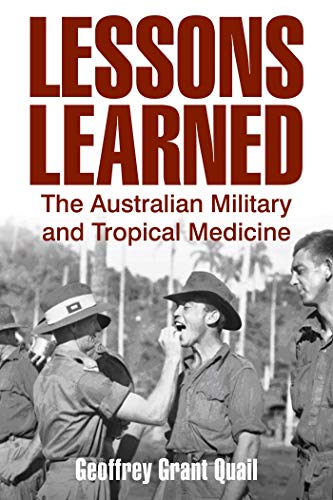Articles liés à Lessons Learned: The Australian Military and Tropical...

L'édition de cet ISBN n'est malheureusement plus disponible.
Afficher les exemplaires de cette édition ISBN
Présentation de l'éditeur :
Historically, prolonged campaigns have been frequently lost or won because of the greater fitness of one of the combatant armies. In the twentieth century, infection was still a major problem, leading to withdrawal from Gallipoli, and the near defeat of the Allies due to malaria early in the Second World War s Pacific campaign. Malaria emerged again as a major problem in the Vietnam War.
The Australian Army Medical Corps, founded in 1901, learned from past medical experience. However, errors leading to significant morbidity did occur mainly in relation to malaria. These errors included lack of instruction of doctors sent to New Guinea with the Australian Force in the Great War, inadequate prophylactic measures against malaria in New Guinea early in World War Two, failure to perceive the threat of emerging resistant strains of malaria in the 1960s, and military commanders not fully implementing the recommendations of their medical advisers.
Many Australian campaigns have taken place in tropical locations; a substantial amount of scientific work to prevent and manage tropical diseases has therefore been conducted by the Army Medical Corps medical researchers particularly in the Land Headquarters Medical Research Unit and the Army Malaria Institute. Their work extends well beyond the military, greatly improving health outcomes throughout the world. This book recognises the efforts of both individuals and the Army s Tropical Disease Research units since Federation in helping the Army succeed in battle.
The Australian Army Medical Corps, founded in 1901, learned from past medical experience. However, errors leading to significant morbidity did occur mainly in relation to malaria. These errors included lack of instruction of doctors sent to New Guinea with the Australian Force in the Great War, inadequate prophylactic measures against malaria in New Guinea early in World War Two, failure to perceive the threat of emerging resistant strains of malaria in the 1960s, and military commanders not fully implementing the recommendations of their medical advisers.
Many Australian campaigns have taken place in tropical locations; a substantial amount of scientific work to prevent and manage tropical diseases has therefore been conducted by the Army Medical Corps medical researchers particularly in the Land Headquarters Medical Research Unit and the Army Malaria Institute. Their work extends well beyond the military, greatly improving health outcomes throughout the world. This book recognises the efforts of both individuals and the Army s Tropical Disease Research units since Federation in helping the Army succeed in battle.
Les informations fournies dans la section « A propos du livre » peuvent faire référence à une autre édition de ce titre.
- ÉditeurBig Sky Publishing
- Date d'édition2017
- ISBN 10 1925520226
- ISBN 13 9781925520224
- ReliureRelié
- Nombre de pages276
Acheter neuf
En savoir plus sur cette édition
EUR 24,59
Frais de port :
EUR 11,66
De Royaume-Uni vers Etats-Unis
Meilleurs résultats de recherche sur AbeBooks
Lessons Learned: The Australian Military and Tropical Medicine
Edité par
Big Sky Pub
(2017)
ISBN 10 : 1925520226
ISBN 13 : 9781925520224
Neuf
Couverture rigide
Quantité disponible : 1
Vendeur :
Evaluation vendeur
Description du livre Hardcover. Etat : Brand New. 254 pages. 10.00x6.75x1.00 inches. In Stock. N° de réf. du vendeur __1925520226
Acheter neuf
EUR 24,59
Autre devise
Lessons Learned: The Australian Military and Tropical Medicine [Hardcover ]
Edité par
Big Sky Publishing
(2017)
ISBN 10 : 1925520226
ISBN 13 : 9781925520224
Neuf
Couverture rigide
Quantité disponible : 1
Vendeur :
Evaluation vendeur
Description du livre Hardcover. Etat : new. N° de réf. du vendeur 9781925520224
Acheter neuf
EUR 38,09
Autre devise
Lessons Learned The Australian Military and Tropical Medicine
Edité par
Big Sky Publishing
(2016)
ISBN 10 : 1925520226
ISBN 13 : 9781925520224
Neuf
Couverture rigide
Quantité disponible : 1
Vendeur :
Evaluation vendeur
Description du livre HRD. Etat : New. New Book. Shipped from UK. Established seller since 2000. N° de réf. du vendeur CA-9781925520224
Acheter neuf
EUR 20,10
Autre devise

